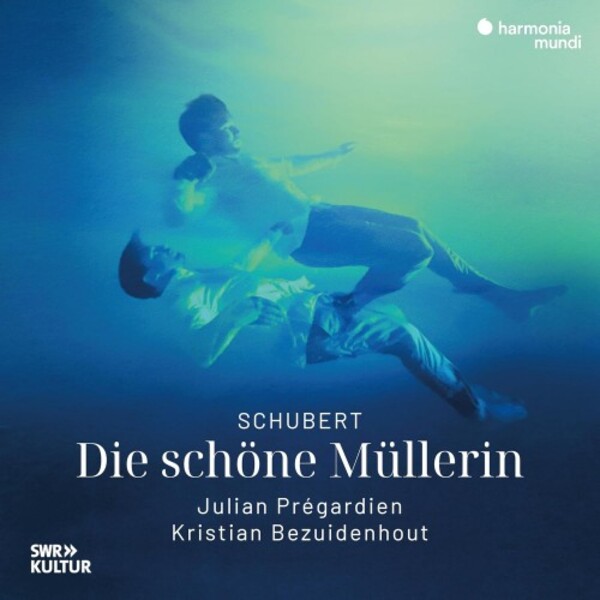SCHUBERT Die schöne Müllerin (Julian Prégardien)
View record and artist detailsRecord and Artist Details
Genre:
Vocal
Label: Harmonia Mundi
Magazine Review Date: 10/2024
Media Format: CD or Download
Media Runtime: 61
Mastering:
DDD
Catalogue Number: HMM90 2739

Tracks:
| Composition | Artist Credit |
|---|---|
| (Die) Schöne Müllerin |
Franz Schubert, Composer
Julian Prégardien, Tenor Kristian Bezuidenhout, Piano |
Author: Richard Wigmore
A child of the 18th century, Schubert’s first interpreter, the baritone Johann Michael Vogl, would routinely subject melodic lines to what one contemporary dubbed ‘small alterations and embellishments’. Reports suggest that Vogl sometimes went over the top. On the whole, though, Schubert seemed happy enough to accept his singer’s tweaks and added decorations. Without going as far as Vogl, Julian Prégardien and fortepianist Kristian Bezuidenhout treat Schubert’s lines even more freely than his father Christoph in his recording with Michael Gees (Challenge Classics, 8/08). Some may throw up their hands. But to my ears Julian’s embellishments and occasional melodic alterations, allied to an unusual flexibility of tempo and rhythm, sound delightfully fresh and spontaneous.
The little ornaments in successive verses of the opening ‘Das Wandern’, deftly touched in, heighten the sense of blithe anticipation. In ‘Der Neugierige’ and the closing line of ‘Pause’ they delicately enhance the miller-poet’s half-dazed questioning. So many turns of phrase in Schubert’s cycle of blighted innocence evoke his beloved Mozart, above all in the central strophic songs, ‘Morgengruss’, ‘Des Müllers Blumen’ and ‘Tränenregen’, whose repeated verses seem to cry out for varied touches of ornamentation. The Mozartian resonances have rarely been so beguilingly apparent.
Crucial here, of course, is the timbre of the fortepiano: a superb modern copy of an 1825 Graf, the kind of instrument Schubert himself knew. Andreas Staier made an eloquent case for a period fortepiano in Christoph Prégardien’s earlier recording (Harmonia Mundi, 12/92). With no fewer than four different pedals, Bezuidenhout’s instrument has an even wider range of colours: from earthy percussiveness, via harp-like delicacy, to the spectral whisper conjured in the final verse of ‘Die liebe Farbe’, that most haunting of suicide notes.
The fortepiano is ideally matched with Julian Prégardien’s sweet, limpid timbre, deployed with minimal vibrato. He fields a liquid mezza voce (most movingly in the final ‘Des Baches Wiegenlied’), and has ample reserves of tone for, say, the apprentice miller’s vision of superhuman strength in ‘Am Feierabend’. Prégardien is not a singer who seems to foresee the miller’s tragic fate from the outset. In the opening songs he veers between open-hearted eagerness and tender reverie. He sings the climactic ‘Mein’ with delirious abandon, allied to a grace that comes more easily to lyric tenors than baritones in this music. With exemplary diction, Prégardien creates a crescendo of mounting rage in ‘Der Jäger’, and catches all the desperation, sarcasm and, finally, feigned insouciance of ‘Eifersucht und Stolz’.
The last three songs all unfold more slowly than Schubert’s tempo markings suggest. But Prégardien and the ever-perceptive Bezuidenhout vindicate them through their concentrated intensity and a hard-to-define quality of spirituality. In ‘Des Baches Wiegenlied’, Prégardien’s other-worldly tenderness, cradled by Bezuidenhout’s gently lapped chords, sets the seal on a Schöne Müllerin that combines tonal beauty, immediacy of characterisation and an enriching sense of spontaneous improvisation. This performance simply feels right, and I suspect father Christoph might agree.
Discover the world's largest classical music catalogue with Presto Music.

Gramophone Digital Club
- Digital Edition
- Digital Archive
- Reviews Database
- Full website access
From £8.75 / month
Subscribe
Gramophone Full Club
- Print Edition
- Digital Edition
- Digital Archive
- Reviews Database
- Full website access
From £11.00 / month
Subscribe
If you are a library, university or other organisation that would be interested in an institutional subscription to Gramophone please click here for further information.




